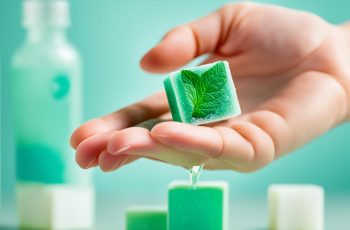I know how frustrating it can be to experience brain fog. The feeling of confusion, forgetfulness, and lack of focus can really hinder our daily lives. Whether it’s caused by lack of sleep, stress, or excessive screen time, brain fog can have a significant impact on our overall well-being.
But don’t worry, there are remedies and lifestyle changes that can help clear brain fog and improve mental clarity. In this article, I’ll share some effective tips and natural ways to get rid of brain fog so you can regain focus and conquer your day. Let’s dive in!
Key Takeaways:
- Brain fog is a common complaint characterized by confusion, forgetfulness, and lack of focus.
- Various factors, such as lack of sleep, overworking, stress, and excessive screen time, can contribute to brain fog.
- Lifestyle modifications, such as reducing screen time, managing stress levels, improving sleep quality, and adopting a healthy diet, can help alleviate brain fog symptoms.
- Natural remedies, including anti-inflammatory foods and supplements, can also support mental clarity and reduce brain fog.
- Implementing strategies for mental clarity, taking regular breaks, and incorporating cognitive aids can further enhance brain health and reduce brain fog symptoms.
What is Brain Fog Syndrome?
Brain fog syndrome is a common condition characterized by a cloudy-headed feeling, forgetfulness, and a lack of mental focus and clarity. It can be caused by various factors, including physiological changes associated with aging, lack of sleep, stress, and excessive screen use.
Individuals experiencing brain fog may also present with symptoms such as trouble sleeping, frequent headaches, low energy levels, impaired cognitive function, mood swings, irritability, and forgetfulness.
To address brain fog, it is essential to understand its underlying causes and seek appropriate treatment options that provide relief. By identifying the root causes and implementing effective strategies, individuals can alleviate brain fog symptoms and regain mental clarity.
It is important to note that brain fog can significantly impact daily life and cognitive function. Therefore, it is crucial to address this condition promptly and explore various remedies and treatments to find relief and improve overall wellbeing.
Lifestyle Factors Contributing to Brain Fog
Brain fog is a common issue that can affect mental clarity and daily functioning. It often stems from various lifestyle factors that contribute to hormonal imbalances and increased stress. Understanding these underlying factors can help individuals make positive changes to alleviate brain fog symptoms and promote overall brain health.
One major lifestyle factor that can contribute to brain fog is excessive exposure to electromagnetic radiation from electronic devices. The constant use of devices like smartphones, tablets, and computers can disrupt brain function and impair cognitive abilities. To reduce this impact, it is important to limit screen time and take regular breaks from electronic devices.
Another lifestyle factor that can lead to brain fog is a disrupted sleep pattern. Lack of quality sleep can impair cognitive function and contribute to mental fatigue. Establishing a consistent sleep schedule and creating a relaxing bedtime routine can help improve sleep quality and reduce brain fog symptoms.
Sedentary behavior and a lack of physical activity can also contribute to brain fog. Regular exercise has been shown to increase blood flow to the brain, improve cognitive function, and enhance mental clarity. Incorporating regular exercise into your daily routine, even in the form of simple activities like walking or stretching, can have a positive impact on brain fog symptoms.
A poor diet can also play a role in brain fog. Consuming processed foods, refined sugars, and unhealthy fats can lead to inflammation in the body and the brain, which can impair cognitive function. To reduce brain fog, focus on adopting a healthy, balanced diet that includes plenty of fruits, vegetables, whole grains, and lean proteins.
Exposure to toxins and pollution can contribute to brain fog symptoms as well. It is important to minimize exposure to harmful chemicals in the environment and maintain a clean living and working space. Additionally, practicing stress management techniques, such as meditation or deep breathing exercises, can help reduce the impact of high stress levels on cognitive function.

By making positive changes to these lifestyle factors, individuals can reduce brain fog symptoms and improve mental clarity. Reducing screen time, managing stress levels, getting regular exercise, improving sleep quality, and adopting a healthy diet are all impactful strategies for reducing brain fog and promoting overall brain health.
Natural Remedies for Clearing Brain Fog
When it comes to improving mental clarity and clearing brain fog, natural remedies can be highly effective. Incorporating anti-inflammatory foods into your diet can help reduce brain fog symptoms and promote cognitive function. Fruits, vegetables, whole grains, and healthy fats are excellent choices to include in your meals and snacks.
Additionally, supplements can provide an extra boost in clearing brain fog. Some supplements that have shown promising results in reducing brain fog symptoms and enhancing mental clarity include fish oil, ginkgo biloba extract, choline bitartrate, gamma oryzanol, L-theanine, phosphatidylserine, inositol, ginseng extract, soy lecithin, L-carnitine L-tartrate, as well as vitamin C, vitamin A acetate, vitamin E, and vitamin B complex.
Supplements and foods rich in nutrients like omega-3 fatty acids, antioxidants, and vitamins can support brain health and help combat the causes of brain fog. However, it is important to consult with a healthcare professional before starting any new supplements or making significant changes to your diet.
Remember, natural remedies are meant to complement a healthy lifestyle and are not a substitute for proper medical treatment. If you’re experiencing persistent brain fog or if it significantly impairs your daily functioning, it’s essential to seek medical advice to address any underlying conditions or causes.
Lifestyle Modifications for Clearing Brain Fog
In addition to natural remedies, making certain lifestyle modifications can significantly help alleviate brain fog symptoms and improve overall brain function. Incorporating these changes into your daily routine can enhance mental clarity and promote a healthier, more focused mind.
Reducing Screen Time and Taking Regular Breaks
One of the key lifestyle modifications to combat brain fog is reducing the amount of time spent in front of electronic devices. Limiting screen time and taking regular breaks throughout the day allows your brain to rest and recharge. Try setting specific intervals for breaks, during which you can engage in activities that do not involve screens, such as taking a walk, stretching, or practicing deep breathing exercises.
Practicing Positive Thinking and Stress Management Techniques
The mind and body are closely connected, and stress can contribute to brain fog. Incorporating positive thinking and stress management techniques into your daily routine can help alleviate both mental and physical stress. This may include practices such as meditation, journaling, deep relaxation exercises, or engaging in hobbies that bring you joy and relaxation.

Improving Sleep Habits
Adequate sleep is crucial for optimal brain function and mental clarity. Ensuring you get enough quality sleep each night can help reduce the occurrence of brain fog. Create a relaxing bedtime routine, establish a regular sleep schedule, and create a calm and comfortable sleep environment.
Avoiding Alcohol and Excessive Caffeine Consumption
Alcohol and excessive caffeine consumption can contribute to brain fog symptoms. While alcohol can impair cognitive function and disrupt sleep, too much caffeine can cause jitters and interrupt sleep patterns. Limiting alcohol consumption and monitoring caffeine intake throughout the day can help promote mental clarity.
Engaging in Enjoyable Activities
Engaging in activities that bring you joy and fulfillment can have a positive impact on brain function. Whether it’s pursuing a hobby, spending time with loved ones, or exploring new interests, doing things that bring you happiness and satisfaction can help clear your mind and reduce brain fog.
Finding Time for Relaxation and Self-Care
Self-care is essential for overall well-being, including mental clarity. Prioritizing relaxation and self-care activities, such as taking baths, practicing self-reflection, reading, or engaging in mindfulness exercises, can rejuvenate the mind and reduce the effects of brain fog.
By implementing these lifestyle modifications, you can take significant steps in clearing brain fog and improving your mental clarity. Remember, it’s important to find a balance that works for you and to be consistent in maintaining these habits over time.
Strategies for Mental Clarity
Implementing strategies for mental clarity can be highly beneficial in supporting brain health and reducing brain fog symptoms.
One effective strategy is to practice mindfulness and meditation, which can help clear the mind and improve focus. Taking a few minutes each day to center yourself and engage in deep breathing exercises can enhance mental clarity and reduce brain fog.
Engaging in brain-stimulating activities like puzzles and games can also sharpen cognitive function and alleviate brain fog. These activities challenge the brain and promote neural connections, resulting in improved mental clarity.
Additionally, maintaining a regular exercise routine is essential for promoting blood flow and oxygenation to the brain. Whether it’s going for a jog, practicing yoga, or taking a dance class, exercise boosts brain health and enhances cognitive function. Regular physical activity is a key strategy for reducing brain fog.
Prioritizing quality sleep is another critical strategy for enhancing mental clarity. A good night’s sleep allows the brain to rest and recharge, improving cognitive function and reducing brain fog symptoms.
Implementing these strategies into your daily life can help maintain mental clarity, reduce brain fog, and improve overall brain health.
Taking Breaks and Cognitive Aids
To find relief from brain fog symptoms, it’s important to incorporate regular breaks throughout the day and utilize cognitive aids. Giving your brain some downtime and pacing your activities with short breaks can significantly improve cognitive efficiency. By managing your workload and incorporating cognitive aids, you can better cope with brain fog and enhance your mental stability.
One effective strategy is to use alarms and reminders to help you stay on track and keep up with your daily tasks. These cognitive aids can be set up on your phone or computer to alert you when it’s time to take a break, switch tasks, or complete important assignments. By relying on these aids, you can reduce stress associated with forgetfulness and improve your overall productivity.
Another helpful cognitive aid is organizing your schedule and tasks using a digital calendar or planner. This allows you to keep track of deadlines, appointments, and important events, preventing you from feeling overwhelmed and ensuring you stay on top of your responsibilities. By using this tool, you can enhance your time management skills and reduce the cognitive load associated with remembering important dates and tasks.
Remember that breaks and cognitive aids are not just a luxury, but rather an essential part of managing brain fog symptoms. By taking breaks and utilizing cognitive aids, you can give your brain the rest it needs and improve your cognitive function. It’s important to experiment with different strategies and find the combination that works best for you in order to find relief from brain fog and achieve mental clarity.
The Role of Diet and Exercise in Clearing Brain Fog
When it comes to clearing brain fog, diet and exercise are essential components. By adopting a healthy lifestyle that includes a low-inflammatory diet and regular physical activity, individuals can support mental clarity and minimize brain fog symptoms.
A low-inflammatory diet is key to reducing inflammation in the body and brain. Emphasizing whole foods, such as fruits, vegetables, and healthy fats, can provide the necessary nutrients to support optimal brain function. These foods are rich in antioxidants and anti-inflammatory compounds that help protect the brain from oxidative stress and inflammation.
Additionally, regular exercise promotes increased blood flow and oxygenation to the brain. Both aerobic exercises, such as running or swimming, and low-impact workouts, like yoga or tai chi, can improve cognitive function and enhance mental clarity. Exercise also stimulates the production of neurotransmitters like dopamine and serotonin, which contribute to improved mood and cognitive performance.
By incorporating a healthy diet and exercise routine into your lifestyle, you can take proactive steps to clear brain fog naturally. Remember to consult with a healthcare professional before making any significant changes to your diet or exercise regimen.
With a focus on nutrition and physical activity, you can support optimal brain health and enjoy improved mental clarity. The combination of a low-inflammatory diet and regular exercise provides a powerful foundation for clearing brain fog and enhancing cognitive function. Take charge of your mental well-being by embracing the role of diet and exercise in your journey to clear brain fog.
Conclusion
Brain fog can have a significant impact on daily life, causing confusion, forgetfulness, and a lack of focus. Fortunately, there are various brain fog treatment options and lifestyle modifications that can provide brain fog relief and help improve mental clarity. By addressing the underlying causes of brain fog and implementing effective strategies, individuals can regain optimal cognitive function.
A comprehensive approach is key to addressing brain fog symptoms. This includes making lifestyle modifications such as reducing screen time, managing stress levels, and adopting a healthy diet. Additionally, incorporating natural remedies and supplements like anti-inflammatory foods, fish oil, and vitamins can further support brain fog relief.
Furthermore, prioritizing mental health and self-care is crucial in combating brain fog. Engaging in mindfulness and meditation practices, participating in brain-stimulating activities, maintaining a regular exercise routine, and getting quality sleep are all effective strategies for promoting mental clarity and reducing brain fog symptoms.
With the right techniques and support, achieving optimal mental clarity and clearing brain fog is possible. By taking proactive steps towards brain fog solutions, individuals can improve their cognitive function and enjoy a clearer, more focused mind.
FAQ
How can I clear brain fog quickly and improve mental clarity?
There are several ways to clear brain fog and improve mental clarity quickly. Some tips include getting enough sleep, reducing stress levels, taking breaks from electronic devices, practicing mindfulness and meditation, and incorporating brain-stimulating activities into your routine. Additionally, adopting a healthy diet and exercise routine can also support optimal brain function.
What is brain fog syndrome and what are its symptoms?
Brain fog syndrome is characterized by a cloudy-headed feeling, forgetfulness, and a lack of mental focus and clarity. Symptoms may include trouble sleeping, headaches, low energy, impaired cognitive function, mood swings, irritability, and forgetfulness.
What are the lifestyle factors that contribute to brain fog?
Lifestyle factors such as lack of sleep, excessive screen use, sedentary behavior, poor diet, exposure to toxins and pollution, and high levels of stress can contribute to brain fog.
Are there any natural remedies for clearing brain fog?
Yes, there are several natural remedies that can help clear brain fog. These include incorporating anti-inflammatory foods into your diet, such as fruits, vegetables, whole grains, and healthy fats. Additionally, certain supplements like fish oil, ginkgo biloba extract, and vitamins B complex, C, and E have shown to be effective in reducing brain fog symptoms.
What lifestyle modifications can help alleviate brain fog?
Lifestyle modifications that can help alleviate brain fog include reducing screen time, managing stress levels, improving sleep habits, avoiding excessive alcohol and caffeine consumption, engaging in enjoyable activities, and practicing relaxation and self-care.
What strategies can I implement for mental clarity?
Strategies for mental clarity include practicing mindfulness and meditation to clear the mind, engaging in brain-stimulating activities like puzzles and games, maintaining a regular exercise routine, and prioritizing quality sleep.
How can taking breaks and using cognitive aids help with brain fog?
Taking regular breaks throughout the day and incorporating cognitive aids such as alarms, reminders, and calendar organization can provide relief from brain fog symptoms. Giving the brain downtime and utilizing cognitive aids can improve cognitive efficiency and reduce forgetfulness and stress.
What is the role of diet and exercise in clearing brain fog?
Diet and exercise play crucial roles in clearing brain fog. Consuming a low-inflammatory diet that includes whole foods, fruits, vegetables, and healthy fats can help reduce inflammation in the body and brain. Regular exercise increases blood flow and oxygenation to the brain, promoting optimal brain function.
How can I effectively alleviate brain fog symptoms and improve mental clarity?
To effectively alleviate brain fog symptoms and improve mental clarity, it is important to address the underlying causes of brain fog and seek relief through a comprehensive approach. This includes incorporating natural remedies and supplements, making lifestyle modifications, prioritizing mental health and self-care, and implementing strategies for mental clarity.




